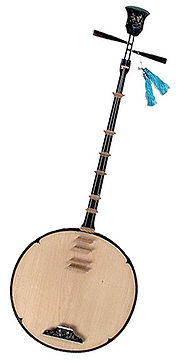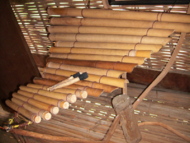
Traditional Vietnamese musical instruments
Encyclopedia

Musical instrument
A musical instrument is a device created or adapted for the purpose of making musical sounds. In principle, any object that produces sound can serve as a musical instrument—it is through purpose that the object becomes a musical instrument. The history of musical instruments dates back to the...
s used in the traditional and classical musics of Vietnam
Vietnam
Vietnam – sometimes spelled Viet Nam , officially the Socialist Republic of Vietnam – is the easternmost country on the Indochina Peninsula in Southeast Asia. It is bordered by China to the north, Laos to the northwest, Cambodia to the southwest, and the South China Sea –...
. They comprise a wide range of string, wind, and percussion instruments, used by both the Viet
Vietnamese people
The Vietnamese people are an ethnic group originating from present-day northern Vietnam and southern China. They are the majority ethnic group of Vietnam, comprising 86% of the population as of the 1999 census, and are officially known as Kinh to distinguish them from other ethnic groups in Vietnam...
(Kinh) majority as well as the nation's ethnic minorities.
Plucked
- Đàn bầu - monochord zither
- Đàn đáy - long-necked three-stringed lute with trapezoidal body
- Đàn nguyệt (also called nguyệt cầm or đàn kìm) - moon-shaped two-string lute
- Đàn sến - two-string lute
- Đàn tam - fretless lute with snakeskin-covered body and three stringsphoto
- Đàn tranh - long zither
- Đàn tỳ bà - pear-shaped lute with four strings
- Đàn đoản (also called đàn tứ) - moon-shaped lute with short neck; little used
- Đàn ghi-ta (also called lục huyền cầm or ghi-ta phím lõm) - "Vietnamized" acoustic or electric guitar with scalloped fretboard; used primarily in cải lươngCai luongTuồng cải lương or cải lương in short, which can be roughly translated as "reformed theater" or "renovated theater" in English, is a form of modern folk opera in Vietnam...
- Đàn tứ dây - bass guitarBass guitarThe bass guitar is a stringed instrument played primarily with the fingers or thumb , or by using a pick....
in the shape of a đàn đáy - CầmCamA cam is a rotating or sliding piece in a mechanical linkage used especially in transforming rotary motion into linear motion or vice-versa. It is often a part of a rotating wheel or shaft that strikes a lever at one or more points on its circular path...
- 7-stringed zither equivalent to the Chinese guqinGuqinThe guqin is the modern name for a plucked seven-string Chinese musical instrument of the zither family...
; no longer used - SắtSATThe SAT Reasoning Test is a standardized test for college admissions in the United States. The SAT is owned, published, and developed by the College Board, a nonprofit organization in the United States. It was formerly developed, published, and scored by the Educational Testing Service which still...
- zither with 25 strings equivalent to the Chinese seSe (instrument)The se is an ancient Chinese plucked zither . It is the ancestor of many Asian zithers, including the Chinese guzheng, the Korean gayageum and the Japanese koto. It has 25 strings with moveable bridges and has a range of up to five octaves.-History:The history of the se extends back to early...
; no longer used - Đàn tính - long-necked lute with a gourd body and two or three silk strings; used by the TayTay peopleThe Tày people speak a language of the Central Tai language group, and live in northern Vietnam. They are sometimes also called Thô, T'o, Tai Tho, Ngan, Phen, Thu Lao, or Pa Di....
, NungNung peopleThe Nùng are an ethnic minority in Vietnam. In China, the Nùng, together with the Tày, are classified as Zhuang people.-Description:The population of the Nùng is estimated to be more than 700,000...
, and ThaiThai peopleThe Thai people, or Siamese, are the main ethnic group of Thailand and are part of the larger Tai ethnolinguistic peoples found in Thailand and adjacent countries in Southeast Asia as well as southern China. Their language is the Thai language, which is classified as part of the Kradai family of...
ethnic groups - Bro - fretted zither with a body made of bamboo and a gourd resonator; used by minority ethnic groups in the Central Highlands
- Goong - tube zither with a bamboo body; used by minority ethnic groups in the Central Highlands
Bowed
- Đàn gáo - two-stringed vertical violin with coconut resonator
- Đàn hồ - two-stringed vertical violin with wooden resonator; hồ derives from Chinese hu, as in huqinHuqinHuqin is a family of bowed string instruments, more specifically, a spike fiddle popularly used in Chinese music. The instruments consist of a round, hexagonal, or octagonal sound box at the bottom with a neck attached that protrudes upwards...
) - Đàn nhị - two-stringed vertical violin*K'niK'niThe K'ni is a Vietnamese Traditional Instrument. It is the only Violin of Jarai people. It is a bowed chordophone which uses the musician's mouth as a resonator which enables the instrument to imitate certain qualities found in vocal music.- Description :...
(also spelled k'ny or k'ný) - one-string vertical violin; played by the Jarai people of the Central HighlandsTây NguyênTây Nguyên, translated as Western Highlands and sometimes also called Central Highlands, is one of the regions of Vietnam. It contains the provinces of Đắk Lắk, Đắk Nông, Gia Lai, Kon Tum, Lâm Đồng....
Oboes
- KènKèn (musical instrument)The kèn is an instrument used in traditional Vietnamese music. It has a double reed and a conical wooden body. It produces a powerful and penetrating high-pitched sound, similar to the Chinese suona, the Korean taepyeongso, and the Persian/Indian shehnai.The best-known player of the kèn is perhaps...
- class of double reedDouble reedA double reed is a type of reed used to produce sound in various wind instruments. The term double reed comes from the fact that there are two pieces of cane vibrating against each other. A single reed consists of one piece of cane which vibrates against a mouthpiece made of metal, hardened...
instruments similar to the oboeOboeThe oboe is a double reed musical instrument of the woodwind family. In English, prior to 1770, the instrument was called "hautbois" , "hoboy", or "French hoboy". The spelling "oboe" was adopted into English ca...
and shehnaiShehnaiThe shehnai, shahnai, shenai or mangal vadya, is an aerophonic instrument, a double reed conical oboe, common in North India, West India and Pakistan, made out of wood, with a metal flare bell at the end...
- Kèn bầu - conical oboe with gourd-shaped wooden bell
- Kèn đám ma - conical oboe with metal bell; used for funeral music in northern Vietnam
Free reed mouth organs
- Đing nǎmGourd mouth organA gourd mouth organ is a traditional wind instrument found in many nations of East and Southeast Asia. It is a free reed mouth organ similar to the Chinese sheng but with a windchest made from a dried bottle gourd rather than metal or wood...
- free-reed mouth organ with gourd body and bamboo pipes; played by upland minorities - M'buotGourd mouth organA gourd mouth organ is a traditional wind instrument found in many nations of East and Southeast Asia. It is a free reed mouth organ similar to the Chinese sheng but with a windchest made from a dried bottle gourd rather than metal or wood...
- free-reed mouth organ with gourd body and bamboo pipes; played by upland minorities
Drums
- Trống - drum played with sticks
- Nruas tuag (also called Ư chua - drum used by the Hmông ethnic group for funeral music
- Trống đồng (also called trống đồng Đông Sơn) - bronze drum played by the Dong Son cultureDong Son cultureThe Đông Sơn culture was a prehistoric Bronze Age age in Vietnam centered at the Red River Valley of northern Vietnam. At this time the first Vietnamese kingdoms of Văn Lang and Âu Lạc appeared...
in ancient times
Tuned percussion

- Cồng chiêng - tuned gong (comes in both flat and knobbed varieties)
- Tam âm la - three small, high-pitched flat gongs in a frame; used primarily in nhã nhạc music
- T'rưng - bamboo xylophone
- Đàn đá - lithophone, commonly having 9+ stone bars, 65cm-102cm in length. It is believed the instrument dates back to 1000 BC. Also called Goong Lú (M’nong people), Kologolo (M’nong people), Gôông Luk (Mạ people).
Other
- Đàn môiĐàn môiĐàn môi is the Vietnamese name of a traditional musical instrument widely used in minority ethnic groups in Vietnam. This instrument is somewhat similar to the jaw harp but there are some differences. Most Đàn môi are crafted out of a single piece of brass and attached with a string to a...
- jaw harp - Klông pút - set of bamboo tubes; hands are clapped near ends of tubes to produce musical tones
- Dao long - singing bowl
- Đàn tre - A hybrid form of the Vietnamese plucked string instrument similar to a Đàn tính – called a Đàn tre – was created by Minh Tam Nguyen, who escaped from Vietnam in 1982 and ultimately settled in Australia. The instrument has twenty-three 800mm-long wire strings attached to a bamboo tube with a metal hose-clamp around the top rim. A four-litre, rectangular olive oil tin, which acts as a resonator, is clamped to the base of the tube. The instrument is capable of playing both Vietnamese and Western music. The instrument can be seen and recordings of it being played by its creator can be heard at the National Museum of AustraliaNational Museum of AustraliaThe National Museum of Australia was formally established by the National Museum of Australia Act 1980. The National Museum preserves and interprets Australia's social history, exploring the key issues, people and events that have shaped the nation....
.
External links
- The traditional music and instruments of Vietnam
- Comprehensive listing of Vietnamese musical instruments
- Hybrid "Đàn tre"
See also
- Music of VietnamMusic of VietnamTraditional Vietnamese music is highly diverse and syncretistic, combining native and foreign influences. Throughout its history, Vietnam has been heavily impacted by the Chinese musical tradition, as an integral part, along with Korea, Mongolia and Japan....
- Space of Gong culture in the Central Highlands of Vietnam
- Vietnamese Wikipedia category: Vietnamese folk musical instruments

